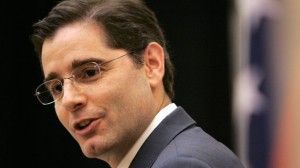Federal Communications Commission Chairman Julius Genachowski criticized television executives Monday afternoon at the annual National Association of Broadcasters (NAB) conference for lobbying against a recent proposal that would make TV stations post the names of super PACs and others paying for political ads on a new FCC website. There is already a law in place that stipulates the data be made available to the public, but most stations keep their records locked up in a filing cabinet far from public view.
Several organizations — including ProPublica, Free Press and the New America Foundation — have launched campaigns to “free the files” asking citizens to visit their local TV stations, make photocopies and upload the records to the Web. And some have done just that.
Broadcasters and other industry execs, including NAB president and CEO, former Senator Gordon Smith, have pushed back and filed complaints, saying that the effort would be a financial burden and a “jobs destroyer.” In his speech, Genachowski dismissed those claims and chastised television executives for opposing greater transparency despite their “proud history of broadcast journalism.”
ProPublica reports that Genachowski went on to “address the broadcasters’ concerns point by point” in his speech. Here’s an excerpt:
The arguments, made in the public record, shouldn’t go unanswered.
First, cost. The argument is that meeting existing disclosure obligations online instead of on paper would be a heavy financial burden and indeed a “jobs destroyer.” But the facts demonstrate the unsurprising conclusion that the cost of online disclosure is nominal and that, indeed, once the transition from paper to digital is complete it will save money – save money for broadcasters, and for other stakeholders: including political candidates, journalists, and the public at large.
It’s also noteworthy that any disclosure costs tied to putting the political file online relate directly to political advertising revenue received by broadcasters, which is estimated to be in the $3 billion range this year, up by large amounts over past years.
Another argument that’s been made: this isn’t an FCC issue. That argument is refuted by the plain language of the law. Congress explicitly requires broadcasters to “maintain, and make available for public inspection, a complete record of a request to purchase broadcast time that is made by or on behalf of a legally qualified candidate, etc.”
Congress placed this requirement in the Communications Act, and explicitly charged the FCC with the obligation to carry out these provisions. It gave both the FEC and the FCC roles, understanding the unique role broadcasters play and that some of the information Congress requires broadcasters to make public is never provided to the FEC, and what is provided is sent weeks or months later. The FCC’s role here is clear, essential and very longstanding.
Another objection is that the disclosed information is “proprietary”, particularly the rates broadcasters charge for political advertising. But, one, Congress explicitly requires broadcasters to disclose this information, and, two, broadcasters already do.
In other words, the argument against moving the public file online is that required broadcaster disclosures shouldn’t be too public. But in a world where everything is going digital, why have a special exemption for broadcasters’ political disclosure obligation?
You can read the transcript of the entire speech at the FCC website.
The FCC is scheduled to vote on the measure on April 27, 2012.
Take Action
Find out more about the initiatives sponsored by ProPublica, the Free Press and the New America Foundation in our Take Action section filed under "Encouraging Campaign Ad Transparency."


